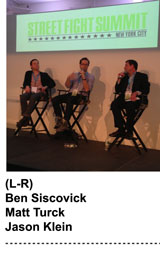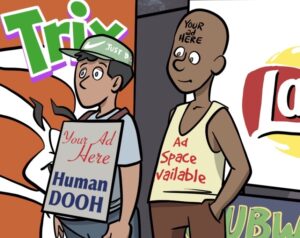 Location-based startups that allow advertisers to personalize their offers and provide other customized services are quickly becoming a highly lucrative space.
Location-based startups that allow advertisers to personalize their offers and provide other customized services are quickly becoming a highly lucrative space.
Google recently bought Waze, the geography-based navigation application, for approximately $1 billion and Foursquare is exploring an IPO. Panelists Matt Turck, managing director of First Mark Capital, and Ben Siscovick, a former partner of IA Ventures, discussed their views on the growth of location-based services with moderator Jason Klein, CEO of On Grid Ventures, yesterday at the Street Fight Summit. Read on for highlights of the panel discussion.
JASON KLEIN: What are some of the most attractive investment opportunities out there?
MATT TURCK: I’m closely following the B2B space, specifically for local. If you look at the history, a lot of successful investments and exits have been made and a lot has been done on the demand aggregation side in terms of extracting information and giving it to advertisers so they can make money. I think there are a lot of opportunities on the supply side that hasn’t been explored.
There is also the fact that software is now so easy to build and customize that you can provide software for SMBs at a low cost. I’m interested in the automation of the SMB space, things that large companies can already do and how that is trickling down to SMBs.
Another area is the convergence of physical and digital. One of the interesting things is Apple using iBeacon. It’s this concept of using Bluetooth low energy, which is by default in everybody’s iPhone as long as you have iOS7. Using that technology, Apple enables retail stores to deploy small bits of hardware that can broadcast data to enable in-store, real-time interactions and the personalization of offers, which is interesting.
BEN SISCOVICK: When I think of location I think of it as a vector from which you can personalize the experience. I think of advertising personalization, content personalization and experience personalization — all of which are dramatically improved by understanding the context of the location in which someone exists.
For example, PlaceIQ … aggregates geosignals and extrapolates from it insight about a certain location. That allows all sorts of experiences to be personalized based on where you are. If you’re in the Bronx, for example, watching a baseball game in the summer, the advertising you are served might be relevant to that context.
Experience personalization is a little different. Uber is an interesting example of experience personalization whereby we are connected to a network and the network can identify where we are located. We can therefore control and interact with a real-world experience or transaction in ways that were never before possible and that’s enabled by being able to identify our location and the location of the taxi cabs that we’re interacting with.
Let’s talk about the billion-dollar opportunity, particularly Waze. Google spent over a billion dollars for a company that many people have never heard of. Do you think they overpaid for it?
BS: What was interesting about this [acquisition] is how similar it is to the logic that Facebook used when they bought Instagram in that it was in some ways a defensive move. Mapping is what it’s all about. If people are using maps as a replacement for the search engine, that’s a big threat for Google.
Apple Maps sucks and Facebook doesn’t have mapping applications, so if they get something that can rival the quality of Google’s maps, then Google is potentially at risk. By paying a billion dollars for Waze and effectively killing it, they protect an important piece of property.
MT: On the price itself, it’s hard to decide if it was a good investment or not. As to what Ben said, there’s something about [Waze’s] business model and product that makes it hard to replicate. As Waze knows, you’re constantly contributing data to the network. Sometimes it’s by actively entering data or doing it passively and when you aggregate all that data at the network level, you have a product that can provide useful insights.
So Google is looking to do some offense and defense, which gets us to the next topic. When you think about investing in this arena, you have massive companies like Google, Yahoo and Facebook on one end and startups on the other, would you invest in an early stage company in this arena?
BS: If you look again at Instagram, it was a new entrant to the social networking space, and it sold for a billion dollars. And the common theme for both of those companies [Waze and Instagram] is that they were mobile-first companies. The mobile paradigm creates all sorts of new opportunities for startups. Uber is also going to be a huge company, I think, because it is a mobile-first company dominating an extremely important real-world interaction that we have every day [with taxi cabs]. So yes, there are lots of opportunities.
MT: I don’t think we would be in this business without believing that startups are well equipped to win in any given market. The classic example is Facebook Places trying to compete with Foursquare and then realizing that it’s not that easy to do.
There’s something fundamental about being a startup and doing one thing extremely well that lets you compete with the giants. By the way, one of the giants that I’m interested in is Twitter. They’re able to do recommendations in real time and I’m surprised it doesn’t seem to be a major priority, so I’m curious to see how that evolves.
What about hyperlocal content? Is that an opportunity or do you want to stay away as an investor?
MT: I think it’s hard. It’s hard to go beyond the ghost-town effect, where you have a few local sites that have some information but others are empty. And this is my personal opinion, but local news is not always gripping. When you look at local sites, it’s often a mix of national and local news. It’s hard to get a network effect going.
BS: I agree that it’s hard, which means you have two VCs saying it’s hard, which means you probably should go out and do it.













